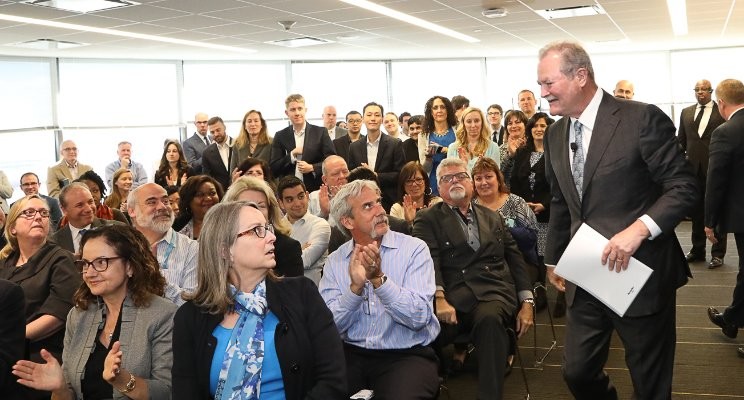
Why your MBA isn’t enough
Communications and other so-called “soft skills,” like project and team management, have always been an important part of every employee’s professional toolkit. These skills are highly valued at AIG, even though our industry isn’t exactly top of mind when you think of fields requiring strong communications skills. But as insurance and our work at AIG becomes more global and complex, being an effective communicator has never been more important.
Today’s workplace looks very different than it did fifty years ago. Open floor plans are the norm, a manager may sit in Dubai while the person who reports directly to them works from home in Chicago, and weekly staff meetings may be hosted in a Google Hangout rather than a conference room. These physical changes to workplace dynamics have only increased the need for employees to have skills that they may not have been taught in school.
AIG’s work today is incredibly interconnected. More than ever, our employees are asked to collaborate with their colleagues across the business. The best actuary, data scientist, or analyst is only as good as their ability to communicate effectively with colleagues or clients. To this point, and beyond AIG, LinkedIn’s Finance Survey shows that 75% of those polled believe communications skills are required to be successful, regardless of sector.
In short, the quant needs to be able to communicate with the creative and vice versa.
Soft skills go beyond the communication of ideas—they’re how people relate to each other on a human level. Empathy, compassion, and concern for colleagues and clients help us connect with one another, build trust, and sustain cooperation. At AIG, we pride ourselves on having these traits embedded into our culture, and we most recently saw them on full display in the wake of Hurricanes Harvey and Irma.
In the face of this devastation, I am so proud of how our people not only stepped up during the response and relief effort, but also how they offered their colleagues and clients kindness and compassion. I’ve heard nothing but good things about my colleagues’ ability to convey hope and offer support to those in distress.
One example that stuck with me came from Kara, an AIG manager, who after the hurricane touched down immediately executed our business continuity plan. She reached out to her colleagues to ensure their safety, then followed up with clients to determine the level of support they needed during this difficult time. So no, hard skills and training couldn’t prepare her for the devastation of a hurricane. But the emotional intelligence and intuition she’s developed throughout her career helped the company to best support its most valuable asset – it’s clients.
Now, these skills take time to learn, and most people hone them over the course of their careers. But in order to prioritize their cultivation, employees at all levels need to be given the opportunity and encouragement to develop them.
Thankfully, our employees have access to a number of development programs such as AIG Early Career, a two-year program focused on developing all the skills required in today’s workplace, including creating a personal brand and effective interpersonal communications. We also offer Claims University, an online course that guides employees through likely client scenarios and skill development in conflict resolution and customer service. In addition, we actively recruit candidates who already have these skills in spades.
While certain skills—including actuarial science, underwriting and claims knowledge—will always be required for a career in insurance, they will increasingly need to be paired with soft skills to make sure we’re providing the best, most holistic support to clients and creating a place where people want to work. AIG will continue to hire and promote with the complete package in mind—the knowledge and expertise to do the job at hand, but also the skills and ability to communicate, empathize, and relate to all kinds of colleagues and clients.
AIG is a team. Our employees must be able to work with their colleagues, clients, and leaders in a collaborative way.
And like any sport, it is our belief that success requires not only an understanding of the game (in our case, risk), but also the ability to play it together (communicating effectively across business units, geographies, disciplines).
Like any professional coach, I am committed to supporting our employees as they rise to meet the latest demands of an ever-changing industry.
#LIFinanceSurvey

Manager | Financial Reporting | Budgeting | Data Analysis | Payables | Receivables | GAAP | Insurance | Reinsurance |
6yGreat article! Having good soft skills are very important in career and life in general.
Global HR Projects | HR Services | HRSS | Global HR Operations |HR Transformation| Workday
6yGreat article indeed. Communication skills and emotional intelligence is a must and if I may add in my opinion self awareness too. In order to be great influencer and collaborator one should understand action- reaction chain in particularly what reactions in others your actions create.
Construction Risk Management / Owners Representative
6yDepends on where you earned your MBA, and what your concentrations are!
Insurance/Reinsurance Executive
6yCheers Claudine, so very true!